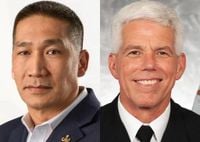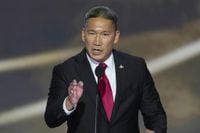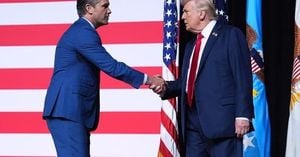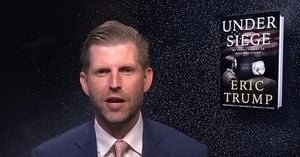On October 1, 2025, the United States Senate confirmed Hung Cao as the Under Secretary of the Navy, marking a significant moment not just for the Navy’s civilian leadership but also for the broader political landscape. Cao, a retired Navy captain, special operations veteran, and former Republican Senate candidate from Virginia, now holds the second-highest civilian position in the Department of the Navy, directly beneath Secretary John Phelan. The confirmation, decided by a 52-45 vote, unfolded along mostly party lines and against the backdrop of a government shutdown—the first seen since late 2018—with no clear resolution in sight, according to Breaking Defense.
Cao’s journey to this post is a testament to both his personal resilience and the evolving nature of political appointments within the Pentagon. Born a Vietnamese refugee and raised in Virginia, Cao’s life has been characterized by service and ambition. He graduated from the U.S. Naval Academy in 1996, later earning a master’s degree in physics, and spent 25 years in the Navy as an explosive ordnance disposal and diving officer, eventually retiring as a captain. His military career included combat service as a Special Operations Officer, a fact highlighted by President Donald Trump when he announced Cao’s nomination in February 2025.
“Hung is the embodiment of the American Dream. As a refugee to our Great Nation, Hung worked tirelessly to make proud the Country that gave his family a home. He went to our amazing United States Naval Academy and later earned his Master’s Degree in Physics. Hung served in combat as a Special Operations Officer for twenty five years. With Hung’s experience both in combat, and in the Pentagon, he will get the job done. Congratulations to Hung, and his wonderful family!” President Trump declared on Truth Social, as reported by WRIC.
Cao’s political ambitions have been no secret. He ran for Virginia’s 10th Congressional District in 2022, losing to Democrat Jennifer Wexton. He then mounted a high-profile, Trump-backed campaign for the U.S. Senate in 2024, challenging incumbent Democrat Tim Kaine. Despite a spirited campaign that saw him echoing many of Trump’s positions—particularly on issues like illegal immigration and military readiness—Cao was defeated by Kaine, who garnered 54.3% of the vote to Cao’s 45.4%, according to WRIC and Washington Examiner. Both Kaine and fellow Virginia Senator Mark Warner voted against Cao’s confirmation, with Kaine joining Democrats in opposition and Republican Senator Lisa Murkowski of Alaska breaking ranks to vote no as well. Murkowski’s opposition forced the Senate to consider Cao’s nomination separately from a larger tranche of 108 nominees, a move permitted under new rules designed to allow any GOP senator to single out nominees for individual scrutiny.
“I was not comfortable offering my support based upon my review of his background and his qualifications,” Murkowski told the Washington Examiner, though she declined to elaborate further on her concerns.
Cao’s confirmation comes at a time when the Navy’s civilian leadership is still taking shape. As of October 1, 2025, only Secretary John Phelan and Cao have been confirmed by the Senate; the remaining four assistant secretaries and the general counsel are all serving in acting capacities, Breaking Defense notes. Brett Seidle, a career Navy civilian, had been performing the duties of undersecretary until Cao’s confirmation. Phelan himself, a businessman and art collector with no military service, was confirmed in March 2025 after a Senate hearing that included pointed questions from Senator Kaine about the Navy’s shipbuilding priorities. “You’re a non-traditional appointee in this position, which can be O.K. if the tradition isn’t working,” Kaine remarked during the hearing, prompting Phelan to pledge a new sense of urgency in naval affairs.
Cao’s appointment is not without controversy. During his Senate campaign, he was an outspoken critic of the Biden administration’s diversity, equity, and inclusion (DEI) policies, blaming them for the military’s recruitment woes. “When you’re using a drag queen to recruit for the Navy, that’s not the people we want,” Cao said during an October 2024 debate with Kaine, as reported by WUSA9. He further argued, “What we need is alpha males and alpha females who are going to rip out their own guts, eat them, and ask for seconds. Those are the young men and women that are going to win wars.” These remarks, and his broader campaign against DEI initiatives, aligned closely with President Trump’s own policies; the Trump administration has since eliminated DEI programs across the Pentagon, according to USNI News.
Cao’s confirmation was also a moment of political theater. The vote fell along party lines, with the exception of Murkowski’s dissent, reflecting the heightened partisanship that has come to define many recent confirmations. The new Senate rules, allowing any one Republican senator to remove a nominee from a confirmation bloc, meant that Cao’s nomination was considered on its own, further highlighting the political significance attached to his appointment.
Meanwhile, the Navy’s leadership team is still evolving. This week, the White House nominated Vice Adm. Karl Thomas, currently the deputy chief of naval operations for information warfare, to receive a fourth star and become commander of U.S. Fleet Forces Command in Norfolk, Virginia. Thomas, who commissioned in 1986 and has commanded several major Navy vessels, would fill the role vacated by Adm. Daryl Caudle, who is now the Chief of Naval Operations. Vice Adm. John Gumbleton has served as acting commander since Caudle’s promotion, as reported by USNI News and Breaking Defense.
Cao’s supporters, including President Trump, have praised his combat and Pentagon experience, emphasizing his status as a self-made American and his commitment to military readiness. Critics, however, have questioned his qualifications and his outspoken positions on DEI and recruitment, with some senators expressing discomfort about his approach to leadership and policy.
For the Navy, Cao’s confirmation could signal a shift in tone and priorities, especially regarding recruitment, diversity, and readiness. His tenure will likely be closely watched by both supporters and detractors, with many wondering how his military experience and political convictions will shape the Navy’s future during a period of significant transition and uncertainty in Washington.
As the government shutdown drags on and the Pentagon’s leadership continues to take shape, Hung Cao’s rise from refugee to Navy undersecretary stands as a striking example of both the opportunities and the contentious politics that define today’s Washington.






